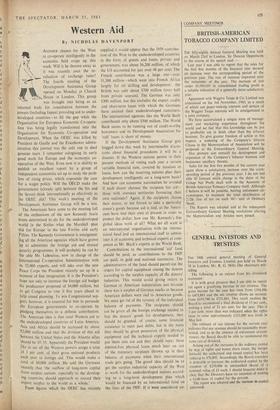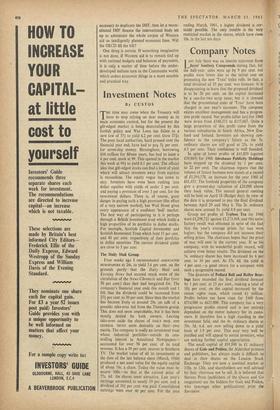Western Aid
By NICHOLAS DAVENPORT
ANOTHER chance for the West to co-operate intelligently in the economic field crops up this k.)9" week. Will it be thrown away as it was recently over the re- , valuation of exchange rates? The fourth meeting of the Development Assistance Group opened on Monday at Church House in London. This group was brought into being as an informal body for consultation between the powers (including Japan) providing aid to under- developed countries—to fill the gap while the Organisation for European Economic Co-opera- tion was being legally transformed into the Organisation for Economic Co-operation and Development. When the OEEC Was killed by President de Gaulle and the Eisenhower admin- istration this journal was the only one to shed genuine tears. I remember eulogising its early good work for Europe and the economic co- operation of the West. Even now it is shortly to publish an excellent report by a group of independent economists set up to study the prob- lem of rising prices, which expounds the case for a wages policy. Will the OECD make the governments (already split between the Six and the Seven) think internationally as effectively as the OEEC did'? This week's meeting of the Development Assistance Group will be a test.
The Americans have come to the meeting full of the enthusiasm of the new Kennedy brain trusts determined to do for the underdeveloped world in the Sixties what the Marshall plan did for Europe in the late Forties and early Fifties. The Kennedy Government is amalgamat- ing all the American agencies which have grown up to administer the foreign aid and mutual security programmes. It will probably be run by the able Mr. Labouisse, now in charge of the International Co-operation Administration with its 52,000 experts, and will take over the new Peace Corps the President recently set up in a moment of fine imagination. It is the President's hope not only to increase the foreign aid budget his predecessor proposed of $4,000 million, but to get Congress to vote it five years ahead to help sound planning. To win Congressional sup- port, however, it is essential for him to persuade the European governments to co-operate by pledging themselves to a definite contribution. 1 he American idea is that total Western aid to the underdeveloped countries of Latin America, Asia and Africa should be increased by about $2,000 million and that the division of this aid between the United States and the Atlantic allies should be 45/55. Apparently the President would like to see all the Western powers assign a total of 1 per cent. of their gross national products each year to foreign aid. This would make a total of $8,000 million. He told the Germans recently that 'the outflow of long-term capital from surplus nations, especially to the develop- ing countries, should approach or exceed their export surplus to the world as a whole.'
From figures which the OEEC has recently supplied it would appear that the 1959 contribu- tion of the West to the underdeveloped countries in the form of grants and loans, private and government, was about $6,200 million, of which the US accounted for just over 48 per cent. The French contribution was a large one--over $1,300 million—which went into French Africa largely for oil drilling and development: the British was only about $700 million (over half from private sources). The German was only $300 million, but this excludes the export credits and short-term loans with which the Germans have assisted their underdeveloped customers. The international agencies like the World Bank contributed only about $500 million. The World Bank seems to be running out of credit-worthy borrowers and its Development Association for 'soft' loans is short of money.
if the Development Assistance Group gets bogged down this week by interminable discus- sions about financial procedures it will be a disaster. If the Western nations persist in their present methods of voting each year a certain variable financial sum, covered by taxation or loans, how can the receiving nations plan their development intelligently on a long-term basis? And how can economic nationalism be avoided if each donor chooses the recipient for aid— those with overseas territories favouring their own nationals? Again, if the recipients choose their donor, or are forced to take a particular donor's goods because aid is tied, as the Ameri- cans have tied their own at present in order to protect the dollar, how can Mr. Kennedy's fine global ideas work at all'? What we all want is an international organisation with an interna- tional fund and an international staff to admin- ister it of economic and technical experts as com- petent as Mr. Black's experts at the World Bank.
Contributions to the international 'aid' fund should be paid, as contributions to the IMF are paid, in gold and national currencies. The administrators of the fund should parcel'out the orders for capital equipment among the donors according to the surplus capacity of the donors' industries. This would avoid giving orders to German or American industrialists just because there was a surplus of German marks or because American dollars were tied to American goods.. We must get rid of the tyranny of the individual balance of payments. The recipients should not be given all the foreign exchange needed to buy the donors' goods for development; they should be granted, of course, some financial assistance to meet past debts, but in the main they should be given possession of the physical equipment and the technical experts needed to put them into use and they should repay these interest-free physical loans much later on out of the monetary surpluses thrown up in their balance of payments when their international trade gets going. The grand idea should be to get the surplus industrial capacity of the West to work for the underdeveloped nations accord- ing to a long-term development plan which would be financed by an international fund on the lines of the IMF. If it were considered un- necessary to duplicate the IMF, then let a recon- stituted IMF finance the international body set up to administer the whole corpus of Western aid on intelligently planned economic lines. Will the OECD fill the bill?
One thing is certain. If something imaginative is not done, if Western aid is to remain tied up with national budgets and balances of payments, it is only a matter of time before the under- developed nations turn to the Communist world, which orders economic things in a more sensible and practical way.



































 Previous page
Previous page